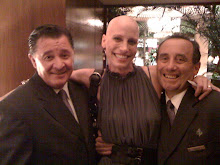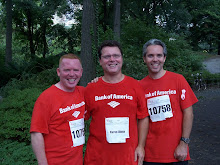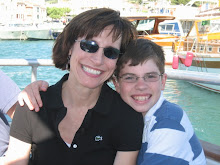Treating cancer takes more than just one doctor. In fact, it takes an entire medical team. For Karen, that includes a surgeon (to remove the cancer), a radiation oncologist (to treat the cancer with radiation), a medical oncologist (to guide the chemo treatments), a plastic surgeon (to reconstruct the breast(s), if necessary), and an internist or primary care doctor to deal with everything else in between.
First up, the breast surgeon, Dr. Tchou (pronounced choo). Dr. Tchou examined Karen and the MRI results and was concerned that the tumor was close to or possibly attached to the chest muscle. This could be a bad thing -- for a lot of reasons. First, removing it might first require chemo to shrink the tumor. Second, detaching it from the muscle could mean cutting into the muscle (that hurts). And third, a tumor that "involves" the chest wall or muscle means you go directly to Stage III cancer. It was not possible to tell for sure from the MRI whether the muscle was involved. More consultation with Karen's medical team of doctors would be necessary...Karen's case (and her tumor) were going to be presented to the "tumor board" (picture a bunch of doctors sitting around a big table deciding whether you have a good tumor or a bad tumor). Anyway, fast forward...the "tumor board" thinks it looks OK and suggests that the surgeon proceed with a lumpectomy. A lumpectomy and "sentinel node biopsy" is scheduled for May 13th.
On deck, Dr. Wu (pronounced woo). Thankfully, Karen has decided she doesn't need Dr. Wu's talented skills just yet (OK...well, maybe just a little lift here or there would be nice). Instead, a lumpectomy will "conserve" the breast (that's a nice word, "conserve", isn't it?). Besides, the reconstruction options weren't all that appealing. Now, most husbands might get excited about the prospect of breast implants for his wife. But trust me, you don't want to go there. This visit was not a good one. In fact, it was one of the few times so far that Karen has broken down. Perhaps it was the thought of a "shark bite" scar on her buttocks (yes, that's exactly how the doctor described the result of taking tissue from your ass to use it to reconstruct your breast). I told you that this was not a good visit.
As we discussed reconstruction options in the event that Karen chose to or had to have a mastectomy, we learned about various options, including 1) using Karen's own tissue to rebuild the breast (she's too thin to take anything from her tummy, thus the buttocks were proposed) or 2) using implants. With implants, talk turned to such things as inflating expanders, symmetry, silicone and saline. But implants were not without their own set of issues and complications. Overwhelmed with all the information -- not to mention a lovely photo album of before/after photographs of other patients -- it became too much to bare. Enough! Meeting over. Done. No shark bites (whatever that looks like)!
The medical team is still being assembled. The radiation oncologist was consulted early on and will enter this drama again in a later act. The use of radiation in Karen's case is still somewhat uncertain. Because Karen is no average case -- I mean, her cancer is no average case -- doctors must also consider whether or not radiation also poses a risk because of her connective-tissue disorder (CTD), Ehlers-Danlos. Radiation is a risk for people with CTDs. Whether her disorder is one of them is still an open question. It's an important question obviously since radiation is a key part of treatment. With radiation, you may be able to keep your breast(s). Without it, we're back to the wonderful world of Dr. Wu and her shark bites. But I'm getting ahead of myself a bit. Radiation doesn't come until after chemo (first they poison you, then they blast you with radiation). This means that while Karen is enjoying chemo, she and her doctors can ponder the radiation question some more.
So, this all sounds rather awful and scary. It is. But Karen is facing it bravely. But, no shark bites for her.
Subscribe to:
Post Comments (Atom)






Nice post. Very well written.
ReplyDeleteThanks for sharing and keep posting.
cancer treatment centers of america
As a young woman going through neoadjuvant chemo for breast cancer who also has Ehlers Danlos this blog has been very inspirational to me and my husband. I'm very nervously nearing the surgery phase of treatment and wondered if you had any details to share about how radiation went for Karen with her EDS? Was it business as usual or were there difficulties?
ReplyDeleteAny comments you can offer would help so much as we're nearing that shark-bite phase with only 2 more chemos to go.
Thank you so much for this wonderful blog that I've been able to relate to so much.